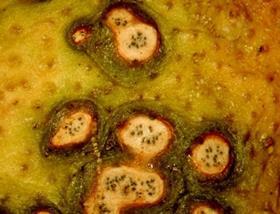
Despite one of the best seasons on record in terms of mitigating the risk of Citrus Black Spot (CBS) symptoms on fruit arriving at European Union borders, the EU seems determined to meet South Africa’s best efforts with unflinching bureaucratic coldness. This was the verdict of a delegation from South Africa that met the EU yesterday (26 November).
The South African delegation, consisting of the country’s Department of Agriculture, Forestry and Fisheries (DAFF) and a delegation of citrus producers, was clearly not impressed with the reaction they received after they presented a report showing that this year the South Africans had an exceptionally good time as far as CBS was concerned.
Clearly they were hoping that the EU would agree to reduce the harsh regulations presently being applied on imported citrus from South Africa.
After leaving the meeting, they wasted no time in going public. They slammed the EU for what they called ‘responding to South Africa’s best efforts with unflinching bureaucratic coldness'.
The EU has a long track-record for its bureaucratic way of dealing with things, but it is unusual for the South Africans to lose their patience and going public with it.
According to the South African statement ,the EU’s Directorate General for Health and Food Safety (DG Sante) 'begrudgingly' acknowledged this year as a good season (as far as CBS was concerned).
“However, the EU showed no interest in reviewing its position on CBS as a quarantine pest, demanding full compliance and refusing to consider any reasonable requests for relaxation of the excessive and unsustainable protocols governing the pest,' the delegation stated.
The South Africans say they exported over 800,000 tonnes of citrus to the EU during the 2018 season (around 40,000 containers), with only two consignments being intercepted with CBS symptoms.
“None of these tested as viable fungi. SA has shown enormous capacity to mitigate the risk of CBS symptoms over the past four years, even though it does not agree with the EU that CBS poses any threat to the EU. In fact, SA is aligned with the general world scientific view that citrus fruit without leaves is not a pathway for the spread of CBS.”
The statement, underwritten by the SA Citrus industry’s special envoy on dealing with matters at the EU, Deon Joubert, says a recent independent study by the highly regarded Bureau for Food and Agricultural Policy institute (BFAP) found that the SA citrus Industry’s opportunity cost associated with the CBS protocols and proactive measures amount to a staggering R1.86bn, which is clearly not sustainable.
“Furthermore, the CBS protocols also require intensive chemical spraying programmes, which is in conflict with a global move towards lower residue production,' the group continues. 'The delegation of SA citrus producers were disappointed by DG Sante who appeared bent on increasing the intensity of their CBS measures - a move that can only be seen as both protectionist and overly aggressive, considering that the EU’s CBS measures remain the subject of an unresolved dispute.”
The South African government, supported by the citrus industry, last year confirmed its intention of approaching the WTO on the matter of EU policy on South African citrus. The words used in this statement – ‘both protectionist and overly aggressive’ – were perhaps chosen carefully and now finally signal the way to a battle in another court.
The result of this meeting comes at a time when South Africans are looking forward to strengthening their ties with the EU amidst the controversy caused by the impending exit of Britain from the European Union.
President Cyril Ramaphosa recently received a warm welcome at the EU and this was followed by a high level state visit to South Africa by the German president, Frank-Walter Steinmeier.
Ramaphosa, in welcoming his counterpart, referred to the need to restore the special South African-German relationship. Increased trade and the removal of barriers to trade would be part of restoring this relationship.
There have also been reports of increased cooperation between some South African grower groups and exporters with counterparts in Southern Europe on the future development of certain varieties and categories of fruit. It seems that this goodwill is not extending to the question of CBS and South African citrus, as far as Brussels politics is concerned.
It is also not inconceivable that the South Africans will increase their focus on Britain to at least effect a better CBS deal there once the UK departs from the EU. Whether trade with South Africa will be top of mind in the UK, which already has to deal with so many issues from the impending exit, remains to be seen.



